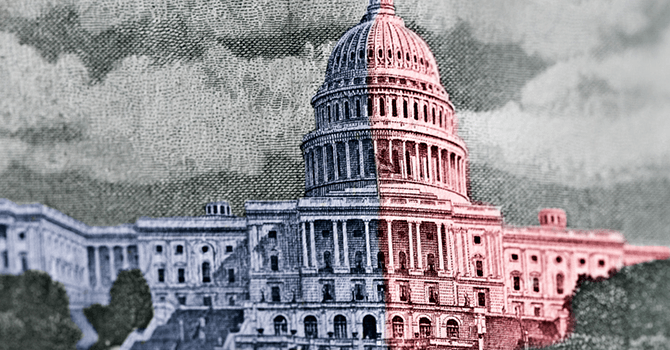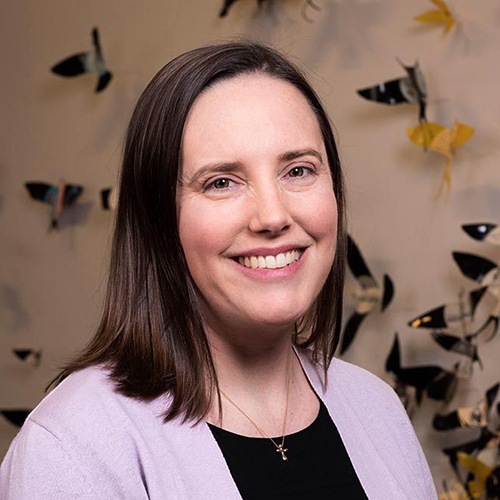During the pandemic, my teenager and I committed to binge-watching together, over many months, television’s longest-running animated series -- “The Simpsons.”
A throughline in the series is Christian life, with the Simpson family grudgingly but regularly attending Sunday worship while also grudgingly but regularly interacting with their evangelical next-door neighbor, Ned Flanders.
In the season 21 episode “The Greatest Story Ever D’ohed,” the most recent of patriarch Homer Simpson’s infuriating and sinful transgressions leads Flanders to tell his pastor, “That man is beyond redemption.”
And yet, inspired by his WWJD bracelet and “Time for a Good Deed” Jesus clock, Flanders invites the Simpson family to join his Bible study group on a pilgrimage to the Holy Land. Despite Flanders’ fervent prayers, Homer is still Homer in Jerusalem: unrepentant, motivated by food and naps.
Finally, after finding Homer napping on Jesus’ tomb, Flanders has had it. “Do you know why I’m a Christian?” he asks. “It’s because I believe every soul has the possibility of salvation. At least I thought so till now. Homer Simpson, you are not worth saving.”
In just more than a week, Joe Biden will be inaugurated as the 46th president of the United States. He has pledged to begin the hard, courageous work of unity and healing -- of restoring a sense of common good.
But how much unity and healing is possible after all the pain, suffering, injustice, sorrow and anxiety of the last year? Of the last week?
How do we reconcile with those people who fomented insurrection, who stormed our nation’s Capitol, claiming Christ and waving Confederate flags? Those people who engaged in theological and intellectual gymnastics to justify treason or took selfies with domestic terrorists? Those people who denied science and facts and refused to wear masks or stay at home? Those people who tore down Black Lives Matter signs at churches or caged children or sought to disenfranchise voters?
Those people.
Those people whose beliefs and practices I believe run counter to our identities, beliefs and practices as Christians. Those people who trigger and traumatize and endanger those at the margins, the very ones Jesus particularly loved. Those people so swept up in toxic American individualism that they simply don’t notice or don’t care how their action (or inaction) affects their communities.
Those people. Are they beyond redemption? Are they worth saving?
The Gospels are clear that we are to love our neighbors, love everyone, no exceptions. But how do we do that if one of the greatest casualties of 2020 is our view of humankind? How must I repair my own heart and soul so that when we do return to gathering in person I do not gaze on other beloved children of God with distrust, suspicion or even contempt? How might we live into our baptismal promises to resist evil and seek justice when the neighbors we are called to love are the ones perpetuating evil and injustice?
The Most Rev. Michael Curry, the presiding bishop of The Episcopal Church, calls this the challenge of learning to “stand and kneel at the same time.”
In “Love Is the Way: Holding on to Hope in Troubling Times,” Curry describes the anger he faced when he began publicly supporting equality for gay and lesbian members of the church. While some people were quietly encouraging, he found himself on the receiving end of considerable rage -- rage that he did not want to reciprocate. So, he said, he learned to stand up for what he believed to be right while also kneeling before the anger as a way to “create space for the other person.”
“When we’re busy wagging fingers at each other, we can’t move away from the nightmare and closer to the dream,” he writes. The love that must animate healing and unity, in our families and our country, Curry says, is not a sentimental feeling but “a commitment to seeking the good and well-being of others” that “makes it possible to disagree on bedrock convictions and yet stay in a relationship.”
A love like that is a choice and a discipline, requiring truth telling, lament and confession as prerequisites to healing and reconciliation, alongside a commitment to honor that we are all made in the image of God. The consequences are dire, Curry writes, if we don’t choose a love like that: “If we can’t make room for people with differing viewpoints, we aren’t living in a democracy anymore. We’re in a dictatorship.”
So what might be next? The way of love requires us to identify common values and dreams, share stories, and work together with our neighbors for our shared future, Curry says. “If we can establish that we’re working toward some common good, whether we like each other or not, then we can be brothers and sisters even when we want to fight like hell.”
Reading Curry’s book, I found myself saying both “Amen!” and “But how?” over and over again. “Amen!” to a vision of a world animated by the love of Jesus that seeks dignity, peace and justice for all people. And “But how?” to the very real challenge of loving and listening to family, friends and strangers alike who are racist, sexist and xenophobic -- and whom, if I am honest, I don’t expect to change.
Bryan Stevenson, the founder and executive director of the Equal Justice Initiative, anticipated this concern and the weariness that accompanies it in an interview with Krista Tippett that was shared in December. He suggested that we shouldn’t focus on the worst thing a person has done but on that person’s humanity, even in the face of terrifying stories, such as the police officer in Alabama who encouraged shooting Democrats or the one in North Carolina who urged a civil war.
Not only is everyone worth saving, but such redemption is possible, Stevenson said: “I do think it’s important that we stay hopeful about our capacity to overcome that bigotry. And I am persuaded that hopelessness is the enemy of justice, that if we allow ourselves to become hopeless, we become part of the problem.”
A “hope dynamic” can spur you to needed action, he said. “Hope is our superpower. Hope is the thing that gets you to stand up when others say, ‘Sit down.’ It’s the thing that gets you to speak when others say, ‘Be quiet.’”
It’s the thing that gets you to walk toward people who are different and difficult when your instincts tell you to run away. And it’s the thing that may yet make healing the fractures in our families, neighborhoods, churches and country possible.
The Episcopal Church announced an effort on Monday to help heal those fractures through a new campaign called "From Many, One." Launching on Martin Luther King Jr. Day, its goal is to help bridge divides by fostering difficult conversations between individuals.
In “The Simpsons,” Homer has an epiphany (caused by dehydration) following his conflict with Flanders. In an impassioned speech to an interfaith crowd at the Dome of the Rock, he notes religions’ teaching that humans can resemble the divine. But, he says, we can never attain that grace “while there is hatred in our hearts for each other.”
If that hatred is in my heart or your heart, are we beyond redemption? Are we worth saving?
Thank God salvation is up to God and not us. Thank God for the reminder that we are all in need of grace and forgiveness, and for the opportunity, again and again, to learn to love as God loves. Thank God for the invitation to sit with anguish in the messiness of our common life and resist easy solutions.
And thank God for the glimpses of hope -- the first Black and Jewish senators from Georgia and the arrival of COVID-19 vaccines -- that remind us our story is still unfolding.


















